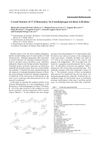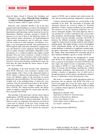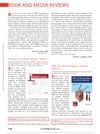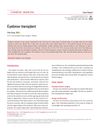 January 2023 in “The Keio Journal of Medicine”
January 2023 in “The Keio Journal of Medicine” Certain gene variants can cause inherited hair diseases, which are important to diagnose and understand for patient care.
 May 2021 in “Benha Journal of Applied Sciences”
May 2021 in “Benha Journal of Applied Sciences” Platelet-rich plasma injections significantly improved acne scars on treated areas of the face.
[object Object] Taking too much biotin can mess up blood test results, which might lead to wrong diagnoses and treatments.
Green tea compound EGCG could potentially treat colorectal cancer by removing iron and causing stress in cancer cells leading to their death.
 April 2012 in “Encyclopedia of Life Sciences”
April 2012 in “Encyclopedia of Life Sciences” Different genes are linked to various types of hair loss.
 June 2010 in “Journal of Chemical Crystallography”
June 2010 in “Journal of Chemical Crystallography” The compound was successfully made and shows potential for treating prostate cancer.
 February 1999 in “Analytical Sciences”
February 1999 in “Analytical Sciences” A new antiandrogen compound was made and its detailed three-dimensional shape was described.
January 2022 in “Aesthetic surgery journal” Extracellular vesicles may effectively treat hair loss with minimal side effects.
 25 citations,
September 2020 in “Molecules”
25 citations,
September 2020 in “Molecules” Quercitrin may help treat hair loss by promoting hair growth and improving cell health.
 22 citations,
August 2019 in “Environmental research”
22 citations,
August 2019 in “Environmental research” Pseudomonas sp. T5-6-I bacteria increase selenium uptake in Brassica oleracea plants by 130%.
 January 2006 in “Fertility and Sterility”
January 2006 in “Fertility and Sterility” The book provides a detailed guide on managing Polycystic Ovary Syndrome and is useful for physicians.
 January 1953 in “The Lancet”
January 1953 in “The Lancet” Alopecia areata's causes are unclear, treatments exist but relapses are common.
 April 2020 in “El-Minia Medical Bulletin”
April 2020 in “El-Minia Medical Bulletin” Microneedling is an effective treatment for hair regrowth in Alopecia Areata.
September 2016 in “Journal of dermatological science” The conclusion is that the variation in hair thinness in patients is mostly due to the amount of underdeveloped hairs, and treatments that thicken fine hairs might work for those with mild to severe conditions.
 239 citations,
July 2002 in “Clinical and Experimental Dermatology”
239 citations,
July 2002 in “Clinical and Experimental Dermatology” Low iron and L-lysine levels can cause hair loss in women, and increasing these nutrients can reduce hair shedding.
![Synthesis of Spiro[cyclohexane-1,2'-[2H]indene] Derivatives as Inhibitors of Steroid 5α-Reductase](/images/research/d91300a7-4d66-4d2c-90ac-293b0dbc5ff5/small/21048.jpg) 8 citations,
June 1995 in “Helvetica Chimica Acta”
8 citations,
June 1995 in “Helvetica Chimica Acta” Compound 15a was effective in inhibiting 5α-reductase.
 1 citations,
September 1984 in “Journal of Biological Education”
1 citations,
September 1984 in “Journal of Biological Education” Plants change their growth in response to shade based on light signals detected by phytochrome.
 January 1953 in “The Lancet”
January 1953 in “The Lancet” Cortisone may help hair regrow by altering the local environment, with regrowth starting 3-4 weeks after treatment, but its use is not widely recommended.
 3 citations,
June 2019 in “Asian Journal of Biological Sciences”
3 citations,
June 2019 in “Asian Journal of Biological Sciences” Indian Ginseng may help promote hair growth for treating alopecia.
1 citations,
September 2020 in “Journal of dermatology” Researchers found a new mutation in the LIPH gene of a woman with a rare hair condition.
 2 citations,
March 2020 in “Plastic and Reconstructive Surgery”
2 citations,
March 2020 in “Plastic and Reconstructive Surgery” The book provides guidelines for using PRP and microneedling in skin treatments, despite limited scientific data.
 June 2020 in “Journal of cosmetic medicine”
June 2020 in “Journal of cosmetic medicine” Eyebrow transplants use hair from the scalp or pubic area, with blonde hair looking more natural, and can leave scars depending on the method used.
 August 2018 in “Current opinion in gynecology and obstetrics”
August 2018 in “Current opinion in gynecology and obstetrics” Gynecologists should learn about transgender care to provide the best service.
 32 citations,
November 2011 in “Reproductive Sciences”
32 citations,
November 2011 in “Reproductive Sciences” Brazilian women with PCOS and both menstrual irregularity and high male hormone levels have a higher chance of having metabolic syndrome.
 30 citations,
February 2018 in “Journal of Pharmacy and Pharmacology”
30 citations,
February 2018 in “Journal of Pharmacy and Pharmacology” Hedychium spicatum has medicinal properties but needs more research for scientific validation and use.
 12 citations,
July 2016 in “British journal of dermatology/British journal of dermatology, Supplement”
12 citations,
July 2016 in “British journal of dermatology/British journal of dermatology, Supplement” Different hair fiber development might explain why hair loss severity varies in patients with a specific genetic mutation, and treatments that thicken hair could help.
11 citations,
April 2012 in “Journal of Investigative Dermatology” A specific mutation in PA-PLA1α causes abnormal hair growth.
 7 citations,
November 2010 in “Genesis”
7 citations,
November 2010 in “Genesis” Mouse Scube3 affects teeth, tongue, vibrissae, and eye development, but not facial structure or limb growth.
7 citations,
May 1977 in “Deutsche medizinische Wochenschrift/Deutsche Medizinische Wochenschrift” Antiandrogen treatments can help with various women's health issues but often require ongoing use.
[object Object] 6 citations,
June 1994 in “Journal of Animal Science” None of the tested compounds created a permanent mark on cattle.












![Synthesis of Spiro[cyclohexane-1,2'-[2H]indene] Derivatives as Inhibitors of Steroid 5α-Reductase](/images/research/d91300a7-4d66-4d2c-90ac-293b0dbc5ff5/small/21048.jpg)









